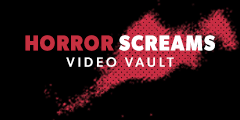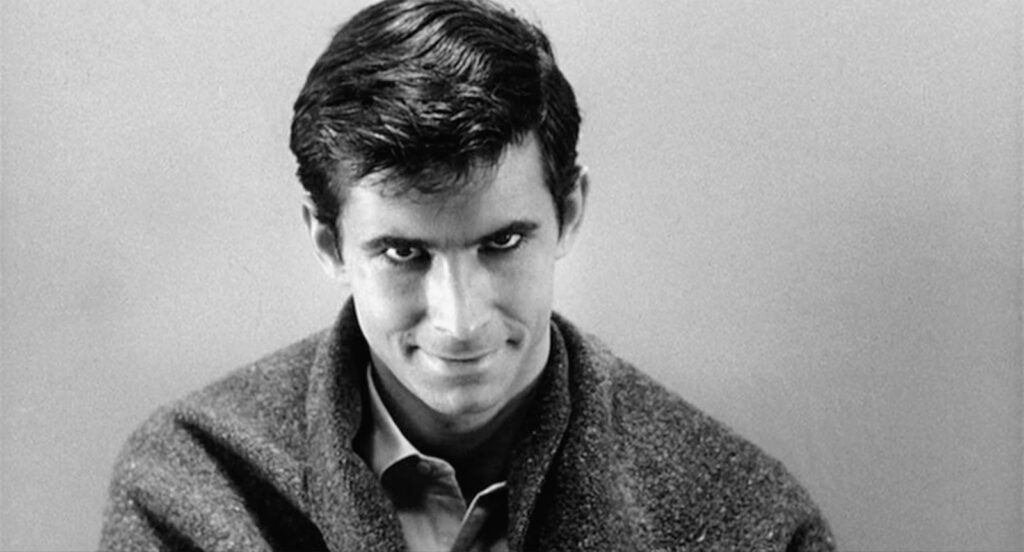Franchise Corner Entry: PSYCHO
PSYCHO ***** USA 1960 Dir: Alfred Hitchcock 109 mins
In any context, PSYCHO needs no introduction. Alongside PEEPING TOM the same year, its success ushered in a bold new era for the horror genre, though even Hitchcock was following in the footsteps of influential earlier films like LES DIABOLIQUES and THE SEVENTH VICTIM –the latter features a suggestively creepy shower sequence. Bernard Herrmann’s string-score has been imitated so much within the genre (and in spoofs outside of the genre) that it has become a universal theme for knife violence even amongst those who haven’t seen the film itself. The transvestite plot twist is no longer shocking thanks to changing attitudes and the fact that it has been reworked in everything from HOMICIDAL to SLEEPAWAY CAMP. Few movies have pulled off the confidence trick of prematurely ending the life of a key protagonist as PSYCHO’s mid-point despatch of a troubled but sympathetic Janet Leigh. Looking past the famous set pieces and once-shocking subversions of convention, however, you realise, on repeat viewings just how oddly moving Anthony Perkins’ portrayal of Norman Bates is, and just how clever the movie’s structure unravels the story from three successive perspectives, part of which involves forcing us to root for the murderer. The quieter moments – like the sad / creepy pre-shower conversation between Perkins and Leigh – now seem as powerful as the scenes that caused such a stir back in 1960. Admittedly, the closing psychiatrist’s speech, which probably seemed patronising to some audiences even back then, clunks like never before, but everything else about PSYCHO is peerless and ageless. It lodged itself into the psyche of at least two generations, and refused to budge.
PSYCHO II **** USA 1982 Dir: Richard Franklin. 108 mins
Two years after Hitchcock’s death and twenty two years after the original movie, director Richard (PATRICK) Franklin and screenwriter Tom Holland did not shame the memory of either. As Norman Bates attempts to adjust to society again after two decades inside, PSYCHO II cleverly refuses to simply follow a familiar horror sequel path, instead deceiving us about Norman’s true mental state while unfolding a hate campaign to drive him insane, conducted by the embittered sister (Vera Miles) of his most famous victim. The script is punctuated by enough grisly murders to ensure the film did not feel overly tame in the slasher-boom of the early 80’s, but Holland’s triumphant meld of suspense and black comedy marks it as a marvellous companion piece to the 1960 movie, with a particularly mischievous and deftly executed punchline involving a double twist and the final, ironic breakdown of Norman’s sanity. Beautifully essaying what turns out to be the most sympathetic character in the film, Perkins returns as Norman Bates, offering an almost painfully moving portrayal of a tormented man dominated by his violent past, eager to move on with his life but finding society unwilling to let him. His haunting performance is at the core of a film full of well-cast actors (Meg Tilly, Dennis Franz, Robert Loggia), though it also doesn’t stint on suspense: Hitchcock acolyte Franklin stages some potent jolts, including an eye at a peephole and a harrowing sequence in which Norman continues talking on a phone that has long since been hung up, while a terrified Tilly tries desperately to convince him no one is there. In the film’s neatest irony, at least three key characters dress up as “Mother” at some point in PSYCHO II, but Norman isn’t one of them…
PSYCHO III **** USA 1986 Dir: Anthony Perkins. 93 mins
Sadly dismissed at the time of its release as just another slasher movie –thanks to a couple of bloody murder scenes involving scantily clad women that were added at the studio’s request – this is the most visually inventive of all the PSYCHO sequels. Making his directorial debut, Perkins pays witty homage to Hitchcock, from a VERTIGO-inspired opening to an extremely clever reversal of the original’s bathroom horror-show. Although amping up Norman’s twitchiness more than ever before, he also offers another haunting portrayal of a piano playing loner doomed by his past and here finding solace in Diana Scarwid’s suicidal nun, herself seeking solace at Bates Motel. While PSYCHO II was a rich study of a reformed murderer’s attempts to re-join society, PSYCHO III bravely offers an understated portrayal of Norman’s attempt to build his first loving relationship. Rare for a modern movie, especially a slasher sequel, PSYCHO III offers an unusually mature depiction of a tender relationship between two emotionally tortured, unfashionable people. Scarwid and Perkins have a fragile chemistry, with one particularly well handled intimate moment that would have turned into a sex scene in cruder hands but here becomes an affirmation of tenderness when Norman admits he just wants the two of them to hold each other. As director, Perkins strikes the perfect balance between tragedy, black comedy and horror, and pulls off a marvellous Hitchcockian bit of unpleasantness involving a female corpse stubbornly stuck in an ice box. The final shot would have made a perfect sign-off for the series: Norman gently stroke Mother’s arm under his handcuffs as he’s escorted to the asylum gain; he looks up, grins directly into the camera and half the screen goes black, casting a shadow over part of his maniacal face before the credits roll.
BATES MOTEL *** USA 1987 Dir: Richard Rothstein 90 mins
A failed pilot to a proposed PSYCHO TV series, this prefigured the franchise’s shift to the small screen with PSYCHO IV – which in turn recreated the Bates Motel and Bates House in a form that doubled as a popular Universal Studios attraction throughout the 90’s in Florida. While at the institution, we learn that Norman found much in common with a mild-mannered, wide-eyed man-child played by Bud Cort, to whom he bequeathed his motel. Cort is a well-cast, interesting substitute for Perkins as the Norman devotee who hears voices and sees a familiar figure in a black dress, and the veteran actors in the cast (Robert Picardo, Buck Flower, Moses Gunn) fare better than Lori Petty’s overly quirky female lead. The film has a surprising lightness of touch, with gags about Mrs Bates’ regular knife-sharpener and an amusing 80’s architect who yearns to modernise the Bates Motel with Jacuzzis and lava pools. The core plot is fairly bland, hinging on familiar elements like a suicidal motel guest (see PSYCHO III), a plot to drive the “new” Norman-figure insane (see PSYCHO II) and a Scooby Doo-style double unmasking at the end. Ultimately, the second half suggests the spin-off series would have taken an anthology approach, using the Bates Motel as a backdrop for ho-hum ghosts-from-the-past stories centered on a motel guest of the week. The formulaic nature of that set up probably explained why it never materialised, though much of BATES MOTEL is enjoyable, and the genuinely odd Cort wraps things up on a suitably eccentric note, addressing the audience straight-to-camera. “BATES MOTEL”, of course, would ironically surface as an unrelated TV series in 2013 at a time when prequels to classic horror properties were in vogue. The show, in its third season as we write this, boasts an exceptional star turn from Freddie Highmore, the only true heir to Perkins’ throne as Norman, and an outstanding, subtly unsettling portrayal of Norma Bates from Vera Farmiga, but their work is largely wasted on uninvolving story arcs about the sub-TWIN PEAKS corruption rife in their small town.
PSYCHO IV: THE BEGINNING *** USA 1990 Dir: Mick Garris. 90 mins
Original screenwriter Joseph Stefano was brought back for this studio-bound made for TV sequel, and it’s full of visual and verbal references to the 1960 movie, with classic lines revived (“Me and my trusty umbrella”!) alongside tributes to the famous set pieces. Its self-justifying gimmick is an insight into Norman’s early life framed by scenes of modern day Norman (Anthony Perkins in one of his last movies) narrating his past on a talk-radio show about matricide. A key problem with a movie like this is that any visual depiction of Norman’s childhood seems destined to pale in comparison to what we have imagined based on suggestions and hints in the earlier films: how can any actress hope to live up to our own imagined conception of what Mrs Bates looked like and sounded like when she was alive? While Olivia Hussey is arguably miscast and weak as the domineering, perverse matriarch, Henry Thomas is highly effective as the teenage Norman, and a neat device involves adult Norman appearing in his own adolescent flashbacks as a kind of shocked bystander. Some of the flashbacks yield suitably queasy moments, like the moment in which Norman gets an erection while rolling around the floor with Mother, and Perkins is as involving as ever, conveying a poignant resignation to his fate as he refers to himself as “an ageing bad seed”. Elsewhere, there are pleasing touches of macabre humour characteristic of the series (asked how he killed his mother, Perkins replies gleefully and simply, “Slowly”), though the plot goes sadly off the rails during a melodramatic finale in which Norman burns down the Bates house to be free and is haunted by his walking-dead victims like the killers in MANIAC and DON’T GO IN THE HOUSE.
PSYCHO ** USA 1998 Dir: Gus Van Sant. 98 mins
Gus Van Sant’s peculiar mission to craft a shot-for-shot remake of a classic movie in order to bring it to a new generation was doomed to critical disdain from the moment it was announced. If the post-SCREAM teen audience was whom Van Sant had in mind, it’s hard to imagine any of them being impressed with such an awkwardly paced movie that, although set in 1998, only slightly tweaks Joseph Stefano’s original script and contains both performances and costume choices that veer between the 1950’s and the 1970’s. For the many fans and connoisseurs of the original, it’s a fascinating train wreck that appears to consider the addition of colour, bare arses and Norman Bates masturbating would be sufficient to make PSYCHO relevant to Generation X. Characteristic of Van Sant’s poor grasp of both 1960 and 1998 audiences is his choice to retain the one weak spot of the Hitchcock film – the closing summing-up by the psychiatrist (here, Robert Forster) – which seems particularly pointless in the Jerry Springer era where transvestism was no mystery. Anne Heche totally lacks the empathetic presence of Janet Leigh, thought you tend to feel sorry for Vince Vaughn, given the “trial by fire” that represents his casting as Norman Bates, one of horror’s most perfectly pitched characters. He reprises Perkins’ cagey candy-chewing and stutter while adding a broad, alarming smile and even a recurring nervous giggle, but his key scenes (notably, the pre-murder conversation with Marion) seem rushed and his physical build totally undermines the original’s conception of Norman as a slight, bird-like, even vulnerable young man. He also looks totally absurd in a long blonde wig. Other mis-steps include the gratuitous post-Ripley / Buffy high-kick from Lila Crane (Julianne Moore) and the terrible decision to punctuate the two famous murder scenes with baffling insert shots of goats on a rainy highway and brewing storm clouds. Ultimately, the most interesting thing about the remake is that the now-55 year old original still packs the kind of punch it can only dream of, and that’s after a zillion repeat viewings.
Reviews by Steven West


6 Comments
Pingback: Film Review: THE ANATOMY OF MONSTERS (2014)
Pingback: Film Review: HARD ROCK ZOMBIES (1985)
Pingback: Film Review: UNHINGED (2017)
Pingback: Film Review: HELL’S KITTY (2018)
Pingback: ENTER ‘THE HOUSE THAT DRIPPED BLOOD’ WE DARE THEE
Pingback: SECOND SIGHT RELEASING AMICUS HORROR ANTHOLOGY ‘ASYLUM’